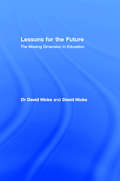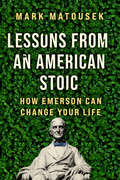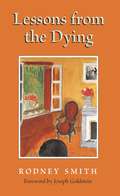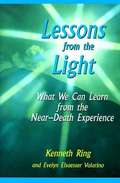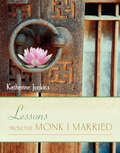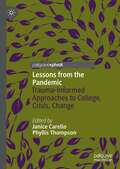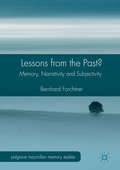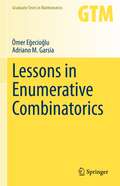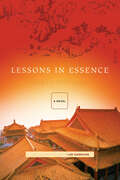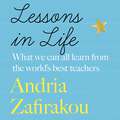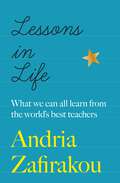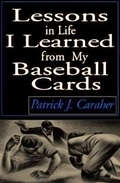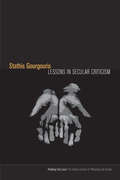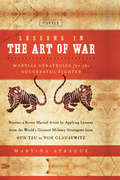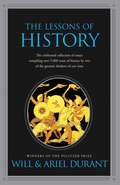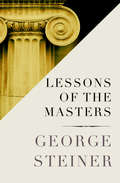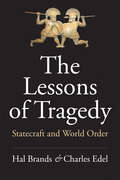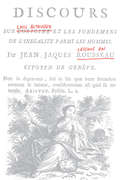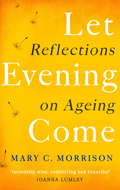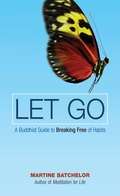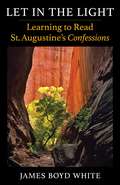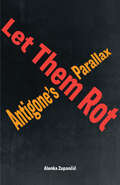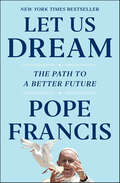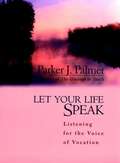- Table View
- List View
Lessons for the Future: The Missing Dimension in Education (Futures In Education Ser.)
by David Hicks Dr David HicksDrawing on the latest research in futures studies, this book provides new insights into ways of helping both students and teachers think more critically and creatively about their own future and that of wider society. It acknowledges the crucial role of education in helping young people understand the nature of local and global change and the social and environmental impacts such change will have on their future. Setting out a clear educational rationale for promoting global and futures perspective in education, it provides helpful and stimulating examples of futures-orientated classroom activities. It also includes fascinating research into children's views of the future.
Lessons from an American Stoic: How Emerson Can Change Your Life
by Mark MatousekA lifelong Emerson lover, teacher, and spiritual seeker reveals how American philosopher Ralph Waldo Emerson’s twelve essential teachings hold the answer to living an authentic and fulfilling life, one that is in harmony with our souls.Ralph Waldo Emerson was a spiritual revolutionary whose profound vision of human potential came to define the American character. Known as America’s original Stoic, he offered a radical message of optimism, authenticity, and self-realization that is more necessary today than ever.In this timely, remarkable book, noted memoirist and teacher Mark Matousek reveals the depths of Emerson’s extraordinary wisdom, demonstrating how his timeless philosophy can help us navigate the challenges of contemporary life. Using personal stories, psychological research, and life lessons from Emerson and his contemporaries—including Thoreau and Whitman— he offers practical lessons in the art of living. In the following pages, you will discover:Why Emerson should be considered America’s original stoicHow to dispel the illusion of our own powerlessness and turn toward boundless human potentialPractical tools for cultivating happiness in a fragile, unpredictable, dangerous worldThe gifts of self-reliance and spiritual renewal necessary for thrivingA roadmap to discovering essential wisdom on living an authentic and meaningful lifeEmerson’s far-reaching vision of excellence and spiritual flourishing is the medicine we need to heal ourselves. “Trust yourself,” he teaches. “Once you make a decision, the universe conspires to make it happen.” This philosophy of hope, known as transcendentalism, is the vein of gold in the American psyche. Lessons from an American Stoic helps us to reclaim our national treasure.
Lessons from the Dying
by Joseph Goldstein Rodney SmithAre a person's perceptions and values altered when facing the end of life? Do the dying see the world in a way that could help the rest of us learn how to live? This book takes us into the lessons of the dying. Through the words and circumstances of the terminally ill, we become immersed in their wisdom and in our own mortality. The dying speak to us in direct and personal ways, pointing toward a wise and sane way to live. In everyday language we can all understand, Rodney Smith extends the conversation about death to people of all ages and states of health. Through exercises and guided meditative reflections at the end of each chapter, the lessons of the dying become a blueprint for our own growth.
Lessons from the Light
by Kenneth Ring Evelyn Elsaesser ValarinoWhile providing many accounts of near-death experiences (NDEs) from men, women, and children of all ages and backgrounds, Lessons from the Light is much more than just an inspiring collection of NDEs. In Lessons near-death expert Kenneth Ring extracts the pure gold of the NDE and with a beautiful balance of sound research and human insight reveals the practical wisdom held within these experiences. This material includes reports of out-of-body experiences, children's NDEs, blind people gaining sight during NDE episodes.
Lessons from the Monk I Married
by Katherine JenkinsLessons from the Monk I Marriedoffers up ten of the most powerful lessons about life, love, and spirituality that Katherine Jenkins has gathered during her marriage to former Buddhist monk Seong Yoon Lee. A seeker in the truest sense of the word, Jenkins went to Korea on a whim, hoping to find the answers to her deepest, most pressing questions about how to find peace and her purpose in life. During her first months there, she sought out a remote temple, where she unknowingly crossed paths with an unassuming Buddhist monk. Months later, they met again by chance-and fell in love. Though their courtship was long, mostly secretive, and fraught with logistical and spiritual considerations, Jenkins and Lee were ultimately married in Korea in 2003. Through their relationship, Jenkins discovered the most important lesson of all: No one holds the keys to peace and happiness-you have walk yourownpath and find yourownwisdom through yourownexperiences. More than the improbable story of a girl from Seattle who found peace of mind (and love) with a Buddhist monk,Lessons from the Monk I Marriedis an approachable guide to the most elemental spiritual questions of our day.
Lessons from the Pandemic: Trauma-Informed Approaches to College, Crisis, Change
by Janice Carello Phyllis ThompsonThis collection presents strategies for trauma-informed teaching and learning in higher education during crisis. While studies abound on trauma-informed approaches for mental health service providers, law enforcement, nurses, and K-12 educators, strategies geared to college faculty, staff, and administrators are not readily available and are now in high demand. This book joins a conversation in place about what COVID has taught us and how we are using what we have learned to construct a new discourse around teaching and learning during crisis.
Lessons from the Past?
by Bernhard ForchtnerThis book reconstructs how claims to know 'the lessons' from past wrongdoings are made useful in the present. These claims are powerful tools in contemporary debates over who we are, who we want to be and what we should do. Drawing on a wide range of spoken and written texts from Austria, Denmark, Germany and the United States, this book proposes an abstract framework through which such claims can be understood. It does so by conceptualising four rhetorics of learning and how each of them links memories of past wrongdoings to opposition to present and future wrongdoings. Drawing extensively on narrative theory, Lessons from the Past? reconstructs how links between past, present and future can be narrativised, thus helping to understand the subjectivities and feelings that these stories facilitate. The book closes by considering if and how such rhetorics might live up to their promise to know 'the lessons' and to enable learning, offering a revised theory of collective learning processes.
Lessons in Enumerative Combinatorics (Graduate Texts in Mathematics #290)
by Adriano M. Garsia Ömer EğecioğluThis textbook introduces enumerative combinatorics through the framework of formal languages and bijections. By starting with elementary operations on words and languages, the authors paint an insightful, unified picture for readers entering the field. Numerous concrete examples and illustrative metaphors motivate the theory throughout, while the overall approach illuminates the important connections between discrete mathematics and theoretical computer science. Beginning with the basics of formal languages, the first chapter quickly establishes a common setting for modeling and counting classical combinatorial objects and constructing bijective proofs. From here, topics are modular and offer substantial flexibility when designing a course. Chapters on generating functions and partitions build further fundamental tools for enumeration and include applications such as a combinatorial proof of the Lagrange inversion formula. Connections to linear algebra emerge in chapters studying Cayley trees, determinantal formulas, and the combinatorics that lie behind the classical Cayley–Hamilton theorem. The remaining chapters range across the Inclusion-Exclusion Principle, graph theory and coloring, exponential structures, matching and distinct representatives, with each topic opening many doors to further study. Generous exercise sets complement all chapters, and miscellaneous sections explore additional applications. Lessons in Enumerative Combinatorics captures the authors' distinctive style and flair for introducing newcomers to combinatorics. The conversational yet rigorous presentation suits students in mathematics and computer science at the graduate, or advanced undergraduate level. Knowledge of single-variable calculus and the basics of discrete mathematics is assumed; familiarity with linear algebra will enhance the study of certain chapters.
Lessons in Essence: A Novel
by Dana StandridgeImbued with the tension of Taipei and the beauty of mountain seclusion, Lessons in Essence uncovers timeless human truths in the crises faced by an honest and vulnerable manTeacher Li is a grumbling Taiwanese master of ancient Chinese arts who suffers constant nightmares about a military takeover of Taiwan by China. His family is in New York seeking U.S. citizenship when Teacher Li has an almost accidental sexual encounter with a student. Knowing everything, his wife returns to Taipei. Miserable, but finding no solace in the city, Teacher Li retreats to the mountains like the Zen hermits of old to write a book about aesthetics. But the purity he seeks is elusive even in mountain exile—he finds a rotting house for shelter, and for company the contrary Dr. Gao and his dropout student lover. Their cynicism juxtaposes Teacher Li's innocence as New York is attacked on September 11, Taiwan's president is shot in an assassination attempt, and the poles of the world seem to shift.With keen insight into human nature, subjects as diverse as erotic paintings, Virginia Woolf's punctuation, and the casual savagery of children, Dana Standridge delivers a powerful story from a complex time in history.
Lessons in Life: What we can all learn from the world’s best teachers
by Andria ZafirakouOne of the world's best teachers discovers from other award-winning teachers what they have come to understand about children.What can the best teachers in the world tell us about our children? What advice can they give to help us raise happy, confident and caring kids? Teachers spend a lot of time with their pupils - talking and listening to them, observing and guiding them. What can we learn from teachers about helping kids become compassionate, contented and successful grown-ups, as well as conscientious global citizens? In Lessons in Life, Andria Zafirakou - the 2018 Global Teacher Prize winner - talks to 30 of the best teachers in the world willing to share their insight and wisdom, gained from years of working with children of all ages.They include:Ranjitsinh Disale (Global Teacher Prize winner 2020), a primary teacher who turned a cattle shed in the drought-prone village of Paritewadi in India into a school. His many skills include showing his pupils how to broaden their horizon, and to become advocates for change;Peter Tabichi (Global Teacher Prize winner 2019), a maths and physics teacher in the Rift Valley Province in Kenya, regularly impacted by famine, who has found a way to make his students care about their studies and believe in a future they can be part of, despite the hardship all around them.Esther Wojcicki (California Teacher of the Year 2002), a leading American teacher who challenged traditional school rules in her lessons to allow her students to take control, learn to believe in themselves and feel empowered.Andrew Moffat (MBE for services to equality in education 2017), a primary teacher in Birmingham who created a teaching resource called 'Challenging Homophobia in Primary Schools' to help his pupils understand the importance of tolerance and open-mindedness. The result is an inspiring, moving and fascinating listen that will help parents identify a child's potential and give them the tools to shine. To know what these incredible teachers know and see what they see is a privilege and a gift.(P) 2023 Quercus Editions Limited
Lessons in Life: What we can all learn from the world’s best teachers
by Andria ZafirakouWhat can the best teachers in the world tell us about our children? What advice can they give to help us raise happy, confident and caring kids? Teachers spend a lot of time with their pupils - talking and listening to them, observing and guiding them. What can we learn from teachers about helping kids become compassionate, contented and successful grown-ups, as well as conscientious global citizens? In Lessons in Life, Andria Zafirakou - the 2018 Global Teacher Prize winner - talks to 30 of the best teachers in the world willing to share their insight and wisdom, gained from years of working with children of all ages.They include:Ranjitsinh Disale (Global Teacher Prize winner 2020), a primary teacher who turned a cattle shed in the drought-prone village of Paritewadi in India into a school. His many skills include showing his pupils how to broaden their horizon, and to become advocates for change;Peter Tabichi (Global Teacher Prize winner 2019), a maths and physics teacher in the Rift Valley Province in Kenya, regularly impacted by famine, who has found a way to make his students care about their studies and believe in a future they can be part of, despite the hardship all around them.Esther Wojcicki (California Teacher of the Year 2002), a leading American teacher who challenged traditional school rules in her lessons to allow her students to take control, learn to believe in themselves and feel empowered.Andrew Moffat (MBE for services to equality in education 2017), a primary teacher in Birmingham who created a teaching resource called 'Challenging Homophobia in Primary Schools' to help his pupils understand the importance of tolerance and open-mindedness. The result is an inspiring, moving and fascinating read that will help parents identify a child's potential and give them the tools to shine. To know what these incredible teachers know and see what they see is a privilege and a gift.
Lessons in Life I Learned from My Baseball Cards
by Patrick J. CaraherRemember when the most exciting moment of your childhood was opening a fresh pack of baseball cards? How you gazed lovingly at the pictures of your heroes, pored over their statistics, thrilled to their exploits and identified with their lives? We all know someone whose baseball card collection was the most significant touchstone of his childhood. Baseball card collector Patrick Caraher has turned his lifelong passion into a spiritual odyssey in Lessons in Life I Learned from Baseball Cards. Selecting some prize items from his collection, Caraher has reflected on their larger resonance and produced this little gem of a book, the sports equivalent of Everything I Need to Know I Learned in Kindergarten. With deft cameos of stars whose admirable lives and careers characterized such virtues as fortitude, humility, determination, honesty, and decency, Caraher has breathed life into the statistics behind baseball's role models and produced a collection of miniature portraits that illuminates the national pastime as few other books have.
Lessons in Secular Criticism
by Stathis GourgourisSecular criticism is a term invented by Edward Said to denote not a theory but a practice that counters the tendency of much modern thinking to reach for a transcendentalist comfort zone, the very space philosophy wrested away from religion in the name of modernity. Using this notion as a compass, this book reconfigures recent secularism debates on an entirely different basis, by showing (1) how the secular imagination is closely linked to society’s radical poiesis, its capacity to imagine and create unprecedented forms of worldly existence; and (2) how the space of the secular animates the desire for a radical democratic politics that overturns inherited modes of subjugation, whether religious or secularist. Gourgouris’s point is to disrupt the co-dependent relation between the religious and the secular—hence, his rejection of fashionable languages of postsecularism—in order to engage in a double critique of heteronomous politics of all kinds. For him, secular criticism is a form of political being: critical, antifoundational, disobedient, anarchic, yet not negative for negation’s sake but creative of new forms of collective reflection, interrogation, and action that alter not only the current terrain of dominant politics but also the very self-conceptualization of what it means to be human. Written in a free and combative style and given both to close readings of texts and to gazing off into the broad horizon, these essays cover a range of issues—historical and philosophical, archaic and contemporary, literary and political—that ultimately converge in the significance of contemporary radical politics: the assembly movements we have seen in various parts of the world in recent years. The secular imagination demands a radical pedagogy and unlearning a great many established thought patterns. Its most important dimension is not battling religion per se but dismantling theological politics of sovereignty in favor of radical conditions for social autonomy.
Lessons in the Art of War
by Martina SpragueWar is a human activity, not one that is limited by geographic location. And the principles of war are the same, regardless of place or number of participants. An army of ten thousand engaged in battle uses the same basic strategies that two people in single combat will utilize.In Lessons in the Art of War, author Martina Sprague explores the writings of both Sun Tzu, the famous Chinese military strategist, and Carl von Clausewitz, the European military genius. Despite the differences in time period, geographic location and culture, both Sun Tzu and von Clausewitz had achieved extraordinary understanding of human nature and how that relates to combat. Sprague takes the similarities and differences in their respective strategies and distills them down to their essence for martial artists to understand and incorporate into their personal practices.
Lessons in the Art of War
by Martina SpragueWar is a human activity, not one that is limited by geographic location. And the principles of war are the same, regardless of place or number of participants. An army of ten thousand engaged in battle uses the same basic strategies that two people in single combat will utilize.In Lessons in the Art of War, author Martina Sprague explores the writings of both Sun Tzu, the famous Chinese military strategist, and Carl von Clausewitz, the European military genius. Despite the differences in time period, geographic location and culture, both Sun Tzu and von Clausewitz had achieved extraordinary understanding of human nature and how that relates to combat. Sprague takes the similarities and differences in their respective strategies and distills them down to their essence for martial artists to understand and incorporate into their personal practices.
The Lessons of History
by Will Durant Ariel DurantIn this illuminating and thoughtful book, Will and Ariel Durant have succeeded in distilling for the reader the accumulated store of knowledge and experience from their four decades of work on the ten monumental volumes of The Story of Civilization. The result is a survey of human history, full of dazzling insights into the nature of human experience, the evolution of civilization, the culture of man. With the completion of their life's work they look back and ask what history has to say about the nature, the conduct and the prospects of man, seeking in the great lives, the great ideas, the great events of the past for the meaning of man's long journey through war, conquest and creation -- and for the great themes that can help us to understand our own era.To the Durants, history is "not merely a warning reminder of man's follies and crimes, but also an encouraging remembrance of generative souls...a spacious country of the mind, wherein a thousand saints, statesmen, inventors, scientists, poets, artists, musicians, lovers, and philosophers still live and speak, teach and carve and sing...."Designed to accompany the ten-volume set of The Story of Civilization, The Lessons of History is, in its own right, a profound and original work of history and philosophy.
Lessons of the Masters (The\charles Eliot Norton Lectures #51)
by George SteinerA thought-provoking examination of the complex teacher-student relationship, from one of the great minds of the modern literary worldBased on George Steiner&’s extensive experience as a teacher, Lessons of the Masters is a passionate examination of the &“profession of the professor.&” He writes about what empowers one person to teach another, and explores the complexities and nuances of this bond. From the charismatic master to the loving disciple, Steiner explores the religious, philosophical, economic, and scientific aspects of imparting knowledge, drawing upon history&’s most famous teachers: Socrates, Jesus, Faust, Virgil, Dante, Heloise, and Abelard.
The Lessons of Tragedy: Statecraft and World Order
by Hal Brands Charles EdelA “brilliant” examination of American complacency and how it puts the nation’s—and the world’s—security at risk (The Wall Street Journal).The ancient Greeks hard-wired a tragic sensibility into their culture. By looking disaster squarely in the face, by understanding just how badly things could spiral out of control, they sought to create a communal sense of responsibility and courage—to spur citizens and their leaders to take the difficult actions necessary to avert such a fate. Today, after more than seventy years of great-power peace and a quarter-century of unrivaled global leadership, Americans have lost their sense of tragedy. They have forgotten that the descent into violence and war has been all too common throughout human history. This amnesia has become most pronounced just as Americans and the global order they created are coming under graver threat than at any time in decades.In a forceful argument that brims with historical sensibility and policy insights, two distinguished historians argue that a tragic sensibility is necessary if America and its allies are to address the dangers that menace the international order today. Tragedy may be commonplace, Brands and Edel argue, but it is not inevitable—so long as we regain an appreciation of the world’s tragic nature before it is too late.“Literate and lucid—sure to interest to readers of Fukuyama, Huntington, and similar authors as well as students of modern realpolitik.” —Kirkus Reviews
Lessons on Rousseau
by Louis AlthusserAlthusser dissects the leading Enlightenment philosopherAlthusser delivered these lectures on Rousseau's Discourse on the Origins of Inequality at the École normale supérieure in Paris in 1972. They are fascinating for two reasons. First, they gave rise to a new generation of Rousseau scholars, attentive not just to Rousseau's ideas, but also to those of his concepts that were buried beneath metaphors or fictional situations and characters. A new way of coming to terms with Rousseau's theoretical rigour, beneath his apparent reveries and sentimental flights of fancy, was here put to work. Second, we are now discovering that the 'late Althusser's' theses about aleatory materialism and the need to break with the strict determinism of theories of history in order to devise a new philosophy 'for Marx' were being worked out well before 1985 - in this reading of Rousseau dating from twelve years earlier, which introduces into Rousseau's text the ideas of the void, the accident, the take, and the necessity of contingency.
Let Evening Come: Reflections on Ageing
by Mary C. Morrison'Incredibly wise, comforting and beautiful' - Joanna LumleyIt is never too soon to start thinking about old age. In Let Evening Come, Mary C. Morrison, herself eighty-seven at the time of first publication, considers the gains and losses of the ageing process in all their depth and richness. She writes about old age from her own personal experience, describing without sentimentality or despair how it actually feels to grow old, to be old, to look back over life, to look forward to death. In a series of meditative passages and journal entries she presents old age as a time that calls for gallantry and courage, but one that also offers unique opportunities for inner growth and wisdom.Let Evening Come is a remarkable book; simply but elegantly written, it is both moving and uplifting. It is not only for those standing on the edge of old age, it is for people of all ages, and once read will be recommended to others for the very special pleasures found within its pages.
Let Go
by Martine BatchelorWhen we break free from the habits that limit us, a new world of possibilities opens up. In Let Go, Martine Batchelor leads the way there. Negative patterns of mind may manifest as fear, avoidance, depression, addiction, judgment of self or other, and any of a host of other physical, mental, or psychological forms. Let Go aims at understanding what really lies at the root of these behaviors so we can reclaim control. Each chapter concludes with an exercise or guided meditation as a tool for the reader to work with negative habits in new and creative ways. You don't have to be a Buddhist for them to work. You just need to want to move on. Helpful exercises and guided meditations - designed to build understanding of our negative habits, as well as the confidence and skill needed to instead embrace our greatest qualities - appear throughout the book. Batchelor also looks at Mindfulness-Based Cognitive Therapy (MBCT) for depression, Dr. Jeffrey Schwartz's use of meditation to deal with Obsessive-Compulsive Disorder (OCD), successful combinations of meditation and Twelve-Step programs, and offers her own innovations.
Let in the Light: Learning to Read St. Augustine's Confessions
by James Boyd WhiteSt. Augustine’s Confessions is heralded as a classic of Western culture. Yet when James Boyd White first tried to read it in translation, it seemed utterly dull. Its ideas struck him as platitudinous and its prose felt drab. It was only when he started to read the text in Latin that he began to see the originality and depth of Augustine’s work.In Let in the Light, White invites readers to join him in a close and engaged encounter with the Confessions in which they will come to share his experience of the book’s power and profundity by reading at least some of it in Augustine’s own language. He offers an accessible guide to reading the text in Latin, line by line—even for those who have never studied the language.Equally attuned to the resonances of individual words and the deeper currents of Augustine’s culture, Let in the Light considers how the form and nuances of the Latin text allow greater insight into the work and its author. White shows how to read Augustine’s prose with care and imagination, rewarding sustained attention and broader reflection.Let in the Light brings new life to a classic work, guiding readers to experience the immediacy, urgency, and vitality of Augustine’s Confessions.
Let Them Rot: Antigone’s Parallax (Idiom: Inventing Writing Theory)
by Alenka ZupančičA provocative, highly accessible journey to the heart of Sophocles’ Antigone elucidating why it keeps resurfacing as a central text of Western thought and Western culture.There is probably no classical text that has inspired more interpretation, critical attention, and creative response than Sophocles’ Antigone. The general perspective from which the book is written could be summarized with this simple question: What is it about the figure of Antigone that keeps haunting us? Why do all these readings and rewritings keep emerging? To what kind of always contemporary contradiction does the need, the urge to reread and reimagine Antigone—in all kinds of contexts and languages—correspond? As key anchor points of this general interrogation, three particular “obsessions” have driven the author’s thinking and writing about Antigone. First is the issue of violence. The violence in Antigone is the opposite of “graphic” as we have come to know it in movies and in the media; rather, it is sharp and piercing, it goes straight to the bone. It is the violence of language, the violence of principles, the violence of desire, the violence of subjectivity. Then there is the issue of funerary rites and their role in appeasing the specific “undeadness” that seems to be the other side of human life, its irreducible undercurrent that death alone cannot end and put to rest. This issue prompted the author to look at the relationship between language, sexuality, death, and “second death.” The third issue, which constitutes the focal point of the book, is Antigone’s statement that if it were her children or husband lying unburied out there, she would let them rot and not take it upon herself to defy the decree of the state. The author asks, how does this exclusivist, singularizing claim (she would do it only for Polyneices), which she uses to describe the “unwritten law” she follows, tally with Antigone’s universal appeal and compelling power? Attempting to answer this leads to the question of what this particular (Oedipal) family’s misfortune, of which Antigone chooses to be the guardian, shares with the general condition of humanity. Which in turn forces us to confront the seemingly self-evident question: “What is incest?”Let Them Rot is Alenka Zupančič’s absorbing and succinct guided tour of the philosophical and psychoanalytic issues arising from the Theban trilogy. Her original and surprising intervention into the broad and prominent field of study related to Sophocles’ Antigone illuminates the classical text’s ongoing relevance and invites a wide readership to become captivated by its themes.
Let Us Dream: The Path to a Better Future
by Pope FrancisIn this uplifting and practical book, written in collaboration with his biographer, Austen Ivereigh, the preeminent spiritual leader explains why we must—and how we can—make the world safer, fairer, and healthier for all people now.In the COVID crisis, the beloved shepherd of over one billion Catholics saw the cruelty and inequity of our society exposed more vividly than ever before. He also saw, in the resilience, generosity, and creativity of so many people, the means to rescue our society, our economy, and our planet. In direct, powerful prose, Pope Francis urges us not to let the pain be in vain. He begins Let Us Dream by exploring what this crisis can teach us about how to handle upheaval of any kind in our own lives and the world at large. With unprecedented candor, he reveals how three crises in his own life changed him dramatically for the better. By its very nature, he shows, crisis presents us with a choice: we make a grievous error if we try to return to some pre-crisis state. But if we have the courage to change, we can emerge from the crisis better than before.Francis then offers a brilliant, scathing critique of the systems and ideologies that conspired to produce the current crisis, from a global economy obsessed with profit and heedless of the people and environment it harms, to politicians who foment their people&’s fear and use it to increase their own power at their people&’s expense. He reminds us that Christians&’ first duty is to serve others, especially the poor and the marginalized, just as Jesus did. Finally, the Pope offers an inspiring and actionable blueprint for building a better world for all humanity by putting the poor and the planet at the heart of new thinking. For this plan, he draws not only on sacred sources, but on the latest findings from renowned scientists, economists, activists, and other thinkers. Yet rather than simply offer prescriptions, he shows how ordinary people acting together despite their differences can discover unforeseen possibilities.Along the way, he offers dozens of wise and surprising observations on the value of unconventional thinking, on why we must dramatically increase women&’s leadership in the Church and throughout society, on what he learned while scouring the streets of Buenos Aires with garbage-pickers, and much more.Let Us Dream is an epiphany, a call to arms, and a pleasure to read. It is Pope Francis at his most personal, profound and passionate. With this book and with open hearts, we can change the world.
Let Your Life Speak: Listening For The Voice Of Vocation
by Parker J. PalmerWith wisdom, compassion, and gentle humor, Parker J. Palmer invites us to listen to the inner teacher and follow its leadings toward a sense of meaning and purpose. Telling stories from his own life and the lives of others who have made a difference, he shares insights gained from darkness and depression as well as fulfillment and joy, illuminating a pathway toward vocation for all who seek the true calling of their lives.
